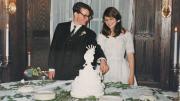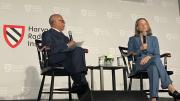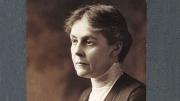No one wants to talk about failing at Harvard—and it’s not because we haven’t experienced failures here. After four years at the school, most students, if we’re being honest, can recall a handful. There are classroom failures and relationship failures: failed problem sets, failed boyfriends, bombed midterms, bombed blocking groups. And then the University’s extracurricular culture—where many of the most sought-after clubs involve a months-long “comp” process before acceptance—enables a culture of rejection, a social climate where we’re often joining one selective organization while getting cut by three.
When I think about failing at Harvard, three things come to mind: the void, the sock, and the Advocate. I’ll work backward. Throughout my freshman and sophomore years, I tirelessly comped the Advocate’s features board, the creative nonfiction section of the literary magazine that attracts some of the strongest writers on campus. I first picked up a copy during Visitas weekend as a senior in high school. When I started comping in the fall, I felt a heightened attraction to extracurriculars, like the Advocate, that I secretly thought might tell me something about myself—something I wanted to believe: that regardless of effort or experience, I possessed an innate creativity that I could project outward as a social identity.
It was freshman fall and the day of the final-round comp essay kept inching closer. But instead of outlining the piece or writing for an hour or two between classes, I spent hours at J.P. Licks every day with my roommate. By the end of the week, two hours before the deadline, I found myself desperately stringing together a personal essay about YouTube vlogs, private school, and surveillance. The text I submitted was tangly and unpolished. When the rejection email arrived, I was not particularly surprised, but I was devastated and embarrassed. I suspected that this failure had uncovered my creative mediocrity.
I believed that creative work could not be scheduled into a Google calendar or approached methodically; inspiration should strike me like a supernatural force. But I also knew that my technique of anxiously nearing a deadline while constructing a haphazard theory on prep-school YouTubers was simply self-defeating. My comp tutor urged me to try again in the spring. I knew that some people comped four or five times before succeeding, so I figured there was nothing undignified about a freshman spring comp. As winter break came to a close, I hoped that the dawn of 2019 would bring me a lightning strike of cultural criticism.
Unfortunately, inspiration in the form of elegant prose seamlessly flowing from mind to page did not arise. I again submitted my piece incomplete and unpolished. This time, though, I wasn’t careening toward the terrifying thing that is 11:59 p.m.—I just hadn’t settled my opinion on a thorny and personal topic. Weeks later, when I opened my inbox and saw that the Advocate “had received an usually high number of compers this semester,” I shut my computer with the same embarrassment I felt in the fall.
By this point, I was hardened against Harvard’s extracurricular culture of constant, unpredictable acceptance and rejection. My peers were getting turned down from club teams, a cappella groups, and comedy magazines. One friend was even rejected by a community-service club. If you threw a rock in Annenberg on Sunday brunch, you’d probably hit a freshman rejected that day from a student organization.
And yet, the second rejection from the Advocate stung. I knew that my essay was not complete because my thoughts on its topic continued to waver, but I didn’t think this should matter. If I were a truly gifted writer, as I was becoming less inclined to believe, my talent would have overcome my half-baked convictions.
I felt rushed to get onto the features board of the Advocate—but my pride stopped me. I did not want to be a serial comper, or, even worse, an ancient 21-year-old comper. After a couple of days of malaise, I decided to put an end to my comping journey and squelch the naïve hope simmering since Visitas. Though I now permanently accepted this rejection, my attitudes toward failing at the College hadn’t changed: I maintained a strangely Calvinist belief that Harvard extracurriculars could expose my predestined niche on this campus and beyond. And so even as I stopped obsessing over my rejection, I still assumed that it meant something. When I was accepted by The Crimson Key Society soon after the Advocate rejection, I similarly thought that this meant something. Crimson Key members had a reputation for being extroverted, jovial, and (dare I say) good-looking, and a part of me internalized the idea that this must be who I really was. A part of me believed that the student institutions of Harvard saw something within me that I could not, so I started questioning my original desire to keep writing—even as a personal practice.
The Sock
A year later, in the spring of 2020, when I won the enrollment lottery to take the sought-after General Education course on studio painting, I rarely thought about my freshman year roller coaster comping the Advocate. I was an optimist. I hadn’t painted since middle school summer camp and held no illusions that I was any good at it. But this was the first semester this class was offered and it attracted a lot of student interest—in my case just because I wanted to fulfill my requirement in the most enjoyable way possible. I got sick during the first week of class and had to work during my own time to make up the first in-class assignment: a monochrome painting of a household object.
I chose a yellow sock. Throughout the next week, I trekked to Carpenter Center, prepared my palette, lay an ankle-length sock on a chair, and got to work. When I finished my painting, I looked at my final product with delight. The sock floated in the center of the canvas with cartoonish charm. It was two-dimensional and smaller than I intended, but the sock looked like a sock, and painting a sock was all I had set out to do. I didn’t think too much about it until my next class section. As I walked to the Carpenter Center, I felt a low hum of anxiety in my chest. I tried to assure myself that this was a GenEd requirement, that this class was designed for beginners. But this is Harvard, and if someone tells you she’s “actually so bad” at something, as a couple acquaintances in the class informed me, you should take this as a hint that they’re actually pretty good.
I did not know that I had failed this assignment until I saw everyone else’s work.
I did not know that I had failed this assignment until I saw everyone else’s work: perfectly shaded bowls, mugs, and combs nestled inside detailed cupboards and bathroom counters. As the critique commenced, it became painfully obvious to me that my painting lacked every technical skill we were meant to practice. I felt my cheeks burn when it was my turn for critique.
Later that day, I got dinner with a friend and divulged the mortifying sock saga. When I couldn’t get through the story without laughing, I discovered I was already over it. I loved my floating yellow sock. I had enrolled in the class to learn how to paint, and here I was, learning how to paint. This class couldn’t tell me anything about myself that I didn’t already know—namely, that I wasn’t a particularly skilled painter. But quieting my ego made me question why, exactly, everyone else in this lotteried GenEd course seemed to have substantial painting skills.
We all avoid failure when we can help it, but at this school, we also perpetuate a culture of performing immediate success and bristling at evidence of painstaking effort. In the arts in particular, the myth of fixed talent and the desire for the creative “lightning strike” obscure the necessity for slow and nonlinear growth. I knew I was bad at painting because I had never really painted. So as I thought back on my prior Advocate failings, I realized that, like most eighteen-year-olds, I also lacked experience in honing the specific literary form of the personal essay. The thought gave me a quiet confidence. I decided to simply follow instructions as best I could for the rest of painting class. I’d take thorough notes in lecture, practice in the Carpenter Center the recommended three times a week, and just see what happened.
The pandemic sent us all home a few weeks after my resolution. On one of our last days on campus, I ran into my former comp tutor. She encouraged me to comp the Advocate again. I told her I’d think about it.
The Void
Once I got back into the swing of comping the Advocate for a third time, it was incredibly low on my ever-present list of worries. Everything was in flux because of the pandemic. I was at home with my mom, the two of us living and working in closer quarters than ever before. As Zoom school carried on, I realized how much I despised it. Given the likelihood of a virtual junior year, I decided to take the semester off. I needed something to fill my time and I needed to earn money, so I started applying to virtual internships in journalism, social-justice advocacy, and entertainment. I submitted dozens of applications to company portals and job-listing sites—and heard nothing. Many of my friends interested in similar fields experienced the same thing: no confirmation of our application, no acceptance, no rejection. We started calling these company portals The Void.
When I got rejected from the Advocate for a third and final time, my emotional response was little more than an impassive shrug. I was much more preoccupied with The Void. I could attribute the failures I experienced with the sock and the Advocate to a lack of experience, a lack of practice, or a lack of skill. But I simply didn’t understand The Void. I didn’t know whether these job postings were fake, I just needed to know someone at the organizations, or my applications were insufficient.
My fixation on The Void—and a melodramatic but deeply felt fear that I would never get a job at a company with an application portal—subsided once I remembered that the Harvard Alumni Directory existed and that I could make a LinkedIn profile. I got a virtual internship in the fall (and another one the next spring). But I maintained a strange gratitude for The Void—not for the administrative nightmare and unfairness inherent to job postings, but for the revelation it gave me. Failure shows us we don’t have control, but it also provides us a moment to reconsider and redefine ourselves on our own private terms.
At the end of the semester, I hung my final painting on my bedroom wall. It was my highly flattering quasi-self-portrait dancing in front of tiger-print wallpaper. Technically, this painting exceeded the sock—there were blending, shadows, and dimension—and yet it contained the same vibrancy and whimsy as that first painting. I realized that this semester of practice sharpened my skills but enabled me to retain some of my original style. Since virtual classes were over and I had nothing but time on my hands, I also came to a matter-of-fact conclusion that if I wanted to be a better writer (I did), I would simply have to keep writing. I made a pact with myself that I would write something every day. And as I wrote, I would try to shush the frantic voice questioning exactly why I was writing, for whom I was writing, and who I must be because of my writing. I would just write in my little notebook and try to start worrying just a little less.








